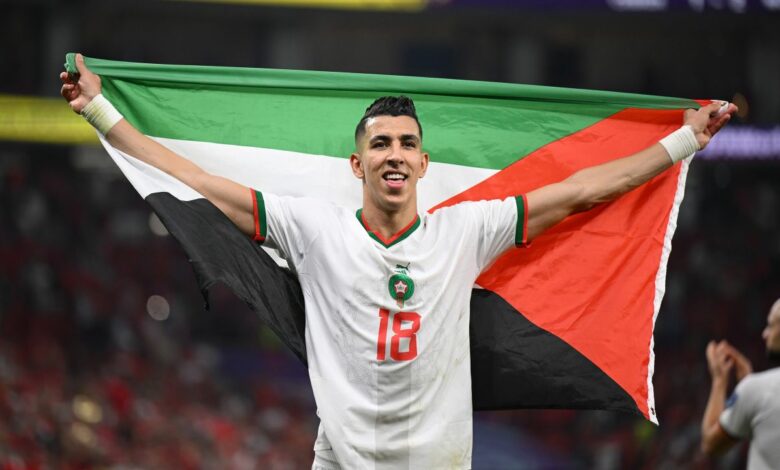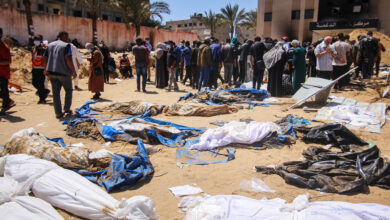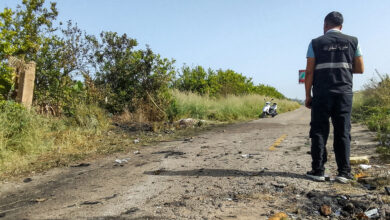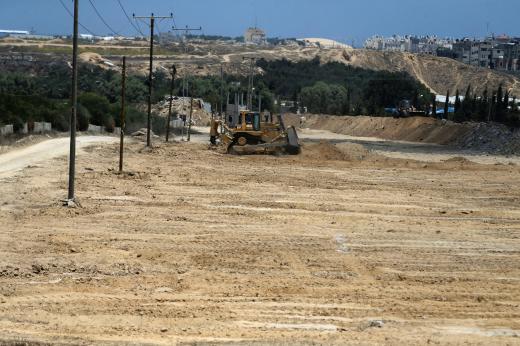
But Israeli reporters sent to cover the tournament say they’re experiencing a less than welcoming atmosphere.
Moav Vardi, chief international correspondent for the Israeli Public Broadcasting Corporation “KAN,” told CNN he was expecting some hostility from Palestinian and Arab fans – but not the level he has experienced in Qatar.
Most Arab fans he tries to interview, Vardi says, will just turn away when they discover he is Israeli even if they had been having a friendly conversation beforehand. But a small and vocal minority is engaging in “violent verbal assaults,” Vardi said.
“You are not welcome here, go away, there is only Palestine, there is no such thing as Israel, Israel does not exist,” Vardi said he’s told almost every day by football fans in Qatar.
Vardi said the impression he has gotten is that the “hatred and resentment” is not just about the Israeli occupation of Palestinian territories. Rather “it’s about the very existence of Israel.”
While he says he hasn’t felt physically threatened, KAN has removed its logo from his microphone, after he was recognized from encounters in Doha that had gone viral on social media.
Former Israeli football star, and now a commentator Eil Ohana posted a video showing a Qatari police officer driving him in a golf cart. After initially getting a shocked reaction from telling the policeman he is Israeli, he says instead that he was joking and that he is actually from Portugal. The police officer says he would have stopped the cart and kicked him off if the commentator was Israeli. When the commentator asked the driver why, he replied, “I’m Palestinian” and goes on to explain that Arabs cannot fly to Israel.
Videos have gone viral in Israel and the Arab world showing football fans yelling at Israeli reporters, refusing to speak to them because of where they are from. Other videos show people hoisting Palestinian flags in the background of Israeli reporters’ live shots, taunting the reporters.
While country flags are generally allowed at matches, clothing or banners with political statements – like LGBTQ rights or those supporting Iranian protesters – have at times led to fans being kicked out of stadiums. But some Arab attendees say the Palestinian cause, which Qatar officially supports, seems to be an exception – in one early match fans held up a giant Palestinian flag with the message “Free Palestine.”
According to sources briefed on the matter, 8,000 Palestinians and 3,800 Israelis applied for World Cup tickets, although thousands more may have entered Qatar on secondary passports.
Israel and Qatar have no diplomatic relations – but under the FIFA rules, Israelis must be allowed to attend the tournament and a small, temporary Israeli consular team is in Doha to assist citizens, who have been advised by the Israeli foreign ministry to keep a low profile.
Omar Barakat, the Palestinian national football team coach, told Reuters in Doha that he was encouraged to take Palestinian flags into matches. He said that he was only allowed by security to take an oversized flag into a stadium on revealing it to be a Palestinian flag. “It’s a political statement, and we’re proud of it,” he said.
On Wednesday, a football fan wearing a Tunisia shirt invaded the pitch with a Palestinian flag during a match between France and Tunisia. When he was apprehended by security personnel, crowds in the stand could be heard chanting “Palestine! Palestine!”
For Farah Hamam, a Palestinian-Jordanian football fan, some Arab fans’ refusal to engage with Israeli journalists reflects the Arab world’s frustration with “the continued atrocities taking place” against the Palestinian people. That was the “real sentiment” toward Israel “despite normalization efforts of Arab governments,” she told CNN.
“For perhaps the first time in history, Arabs around the world are unapologetically showing their lack of patience with Israel,” she said.
Israel in recent years normalized relations with the United Arab Emirates, Bahrain and Morocco, a move that was seen as a major diplomatic feat for the nation and a way out of its regional isolation.
Talal Hizami, a Saudi football fan at the World Cup, linked Arab attitudes toward Israelis in Doha to a pushback against Israel’s recognition by those states. “It’s a rejection of the normalization of Israel in the Middle East…. many Arab citizens see this as a betrayal,” he told CNN.
He said Israeli journalists may have mistakenly assumed that the normalization trend toward Israel in the Arab world “is a reflection of what the people of those nations feel towards them when in reality, many are extremely angered by it.”
Qatar’s Ministry of Foreign Affairs and its Supreme Committee for Delivery & Legacy (SC), the tournament organizers, didn’t respond to CNN’s requests for comment on the treatment of Israeli reporters or the display of political symbols at the World Cup.
Reacting to how he says he was treated by Arabs in Doha, Raz Shechnick, a reporter for the Israeli Yediot Ahronoth newspaper, posted a long Twitter thread in Hebrew about his experience, saying “I was always a centrist, liberal and open [with] a will to make peace above all. I always thought the problem was governments, the rulers, ours too. But, in Qatar I came to realize how hatred is present with people on the street. How much they want to wipe us off the face of the earth. To what extent everything related to Israel arouses intense hatred in them.”
Roy Jankelowitz, a correspondent for the IsraelSport website, said he has not had as many problems in Doha but that he does not “go around walking with a microphone in Hebrew.”
“As an Israeli, I understand that there may be a problem over here for people to accept that Israelis are here because of the fact that they do not know much about Israel. All they see is what the media, the local Arab media reports to them about Israel,” he told CNN. “All they see is, when they see something in Hebrew they think it is something bad.”
Jankelowitz said he’s taken the Israeli Foreign Ministry advice to all Israeli attendees to keep a low profile and does not necessarily tell fans he is from Israel unless he feels it is safe to do so.
“You have to understand that you’re in an Arab country and not everybody likes you,” he said.
But not all Arabs in Doha agree that the football tournament is an appropriate place to show support for Palestinians. Munser Al Shibly a fan from Libya at the World Cup, told CNN it was “nice” to see fans support Palestinians but added that football should be “separate from politics… even if it’s the Palestinian cause.”
Vardi, the Israeli KAN reporter, said despite some hostility, he’s also had some fascinating interactions – like after being recognized while watching a match and being told to “go away” by one fan, a different fan from Saudi Arabia sitting near him turned and said, “Oh Israel? Why don’t you get rid of Iran for us please.”
With additional reporting by Nadeen Ebrahim, Celine Alkhaldi, Zeena Saifi and Mariam Dirar Alqasem.



